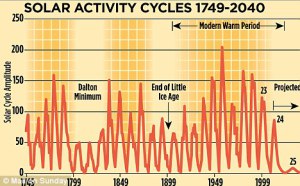– Russian Scientists: ‘We Could Face Cooling Period For 200-250 Years’ (Climate Change Dispatch, April 29, 2013):
Global warming which has been the subject of so many discussions in recent years, may give way to global cooling. According to scientists from the Pulkovo Observatory in St.Petersburg, solar activity is waning, so the average yearly temperature will begin to decline as well. Scientists from Britain and the US chime in saying that forecasts for global cooling are far from groundless. —The Voice of Russia, 22 April 2013Evidently, solar activity is on the decrease. The 11-year cycle doesn’t bring about considerable climate change – only 1-2%. The impact of the 200-year cycle is greater – up to 50%. In this respect, we could be in for a cooling period that lasts 200-250 years. The period of low solar activity could start in 2030-2040 but it won’t be as pervasive as in the late 17th century. –Yuri Nagovitsyn, Pulkovo Observatory St.Petersburg, The Voice of Russia, 22 April 2013
“There are no grounds to claim that global warming will continue till the end of this century,” said academician Vladimir Kotlyakov, head of the Institute of Geography at the Russian Academy of Sciences. “Early signs of cooling are already there and the trend may pick up in coming years.” “Human activity and industrial discharges do have a great impact on environment, but forces of nature are far more powerful,” said the scientist, who has studied Antarctic ice cores that are hundreds of thousand years old. “Climate moves in natural cycles of warmer and colder, drier and more humid times.” –Vladimir Radyuhin, The Hindu, 22 April 2013
“The past cold winter of course has nothing to do with climatic changes that occur over decades-long periods,” said Dr. Yuri Nagovitsyn, academic secretary of the Pulkovo Observatory near St. Petersburg. “But our forecast is that [the] next generations will have to grapple with temperatures several degrees lower than those we have today.” –Vladimir Radyuhin, The Hindu, 22 April 2013
The sun could be on the threshold of a mini-Maunder event right now. Ongoing Solar Cycle 24 is the weakest in more than 50 years. Moreover, there is (controversial) evidence of a long-term weakening trend in the magnetic field strength of sunspots. Matt Penn and William Livingston of the National Solar Observatory predict that by the time Solar Cycle 25 arrives, magnetic fields on the sun will be so weak that few if any sunspots will be formed. Independent lines of research involving helioseismology and surface polar fields tend to support their conclusion. “If the sun really is entering an unfamiliar phase of the solar cycle, then we must redouble our efforts to understand the sun-climate link,” notes Lika Guhathakurta of NASA’s Living with a Star Program. -–NASA News, 8 January 2013
German meteorologists say that the start of 2013 is now the coldest in 208 years – and now German media has quoted Russian scientist Dr Habibullo Abdussamatov from the St. Petersburg Pulkovo Astronomical Observatory as showing it is proof as he said earlier that we are heading for a “Mini Ice Age.” Talking to German media the scientist who first made his prediction in 2005 said that after studying sunspots and their relationship with climate change on Earth, we are now on an “unavoidable advance towards a deep temperature drop.” —German Herald, 31 March 2013
Has there ever in history been such an almighty disconnect between observable reality and the delusions of a political class that is quite impervious to any rational discussion on climate and energy policy? –Christopher Booker, The Sunday Telegraph, 27 April 2013


